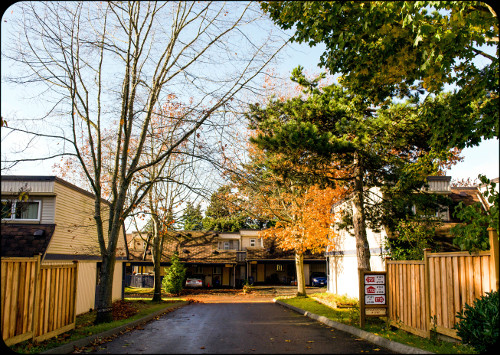About Common Ground
Work began to develop Common Ground in 1978, building upon the vision of the Westminster Unitarian Church. After several years in preparation, the site broke ground on Feb. 13, 1982 and a year later, all 46 units were complete.
Like other co-ops, the members here volunteer their time in order to ensure the day-to-day functioning of the strata.
At Common Ground, we have certain expectations of our members. At a minimum, we expect that members will attend monthly meetings (10 per year, held on the last Wednesday of the month), and that they will be active in one of our committees. We also hold spring and fall clean ups, which are mandatory for all members.
The benefit of being an active member at Common Ground is that it means you are not just renting, but are part of a community. This is one of the primary advantages of co-op living.
One of our big celebrations here at Common Ground is Canada Day, which often involves bouncy castles for kids, a day-long list of activities and races, a barbecue at day’s end, and a trivia quiz about Canadiana. We are also abuzz with activity at Hallowe’en (best decorated carport anyone?), Christmas and Easter.
Please note that while Common Ground Co-Op is not currently accepting applications, we will post a notice on this web site when an opening occurs and will provide details on how to apply as well as the type of unit available. At that time the Membership Committee will arrange interviews with prospective new members based on the applications received.
About co-op housing in general
There are many kinds of co-operatives: food co-ops, co-op daycares, credit unions, retail co-ops, worker co-ops and housing co-ops. Any group of people can form a co-operative. The members own the co-operative and the co-operative provides a service they need. Housing co-operatives provide housing.
Since the 1930s, Canadians have been building and living in housing co-ops. The people who live in the housing are the co-op’s members. They elect, from among themselves, a board of directors to manage the business of the co-op.
Each member has one vote. Members work together to keep their housing well-managed and affordable.
Over the years, federal and provincial governments have funded various programs to help Canadians create non-profit housing co-ops. The co-ops developed under these programs provide good quality, affordable housing. There are more than 255 non-profit housing co-ops comprising 14,300 units in British Columbia.
As a co-op member, you have security of tenure. This means that you can live in your home for as long as you wish if you follow the rules of the co-op and pay your housing charge (rent). As a co-op member, you have a say in decisions that affect your home. You and your neighbours own your homes co-operatively. Members form a community that works together to manage the co-op. Co-op communities are made up of all kinds of people—people with different backgrounds, incomes and special needs. These diverse and vibrant communities are the unique strength of the co-op housing movement.
You can learn more about co-op housing through the Co-op Housing Federation of B.C. or the Co-operative Housing Federation of Canada.
